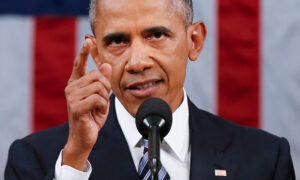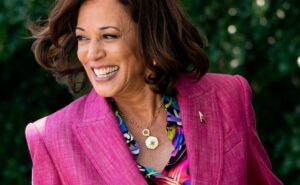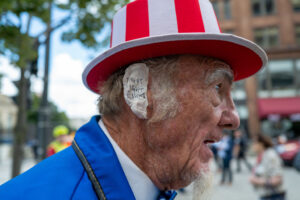My father told me that those who work in Hollywood are America’s aristocrats. Everyone else is a civilian. It was a concept that said less about how the world perceived my father than about how he perceived himself. After all, he had been nominated twice for Academy Awards. He knew Elizabeth Taylor and Frank Sinatra. Did such things not qualify him to be, in the words of the great Romantic poet Percy Shelley, an unacknowledged legislator of the world?
His words of wisdom came to mind with renewed relevance when, after hours of listening to union leaders, state senators, small-town mayors, mid-west Lieutenant Governors, and other various and sundry lawmakers drone and splutter into the microphone at this week’s Democratic National Convention in Chicago, the actor and director Tony Goldwyn waltzed up centre stage.
“Hello, Chicago!”
His voice was rich, warm and inviting, his gaze direct and guileless, his delivery straight from the Academy Theater on Wilshire Boulevard — smoothly evincing the supreme artistic feat of artlessness. “Wow,” he said. “How about that AOC?”
To be honest, it didn’t really matter what the hell he said. What mattered was his presence, which coalesced what had been one minute before a rag-tag bunch of rabid networkers, lunch-box pols and sign-toting riff-raff, and sanctified a ritual of celebration. Everyone knew that Tony Goldwyn stood on the dais of the United Center as the incarnation of Fitzgerald Grant III — not a real President of the United States, but the one he played on TV, the one from Shonda Rhimes’s Scandal.
This kind of deliberate and fully conscious public performance that conflates art and life has become common in American politics. In the weeks after Kamala Harris became the Democrat’s nominee, as Chris Rock and Joy Behar made the rounds of Democratic fundraisers, treading the tailored lawns of ritzy Long Island mansions, it was as if the “forests wild” of A Midsummer Night’s Dream — that enchanted grove of magic and misperception — had been transported to the Hamptons. In short, the lines separating entertainment, politics, news media and money had been irrevocably breached. Nor did it take Rod Stewart mocking Donald Trump for turning orange or George Clooney denouncing the ex-President as a “xenophobic fascist” to suggest that there was something about celebrities that might power Kamala to the Oval Office.
Already, stars and household names were beginning to tweet and Insta their full-on Kamalamania, as out marched the splendorous legions of Kamala’s LA posse, from Cardi B to Charli XCX — not to neglect Lizzo. Prognostications of Kamala’s chances caromed across the star-struck commentariat in language that had little to do with the geography of the electoral college or, say, the swing districts of Georgia or Michigan, tending instead towards one of those Maps of the Stars they hock on Hollywood Boulevard, promising vicarious visions of, well, everyone up to and including the starlets of RuPaul’s Drag Race — each of whom had declared their support for Kamala. To be honest, in the days before the convention I was tempted to do nothing but exhaust my allotted 2,500 words with a list of bold-faced names, send the invoice to UnHerd, and call it a day.
Donna Langley, Chairman of Universal Studios, was on Kamala’s side, as was Chris Silbermann, managing director at Creative Artists Agency, and Disney Entertainment co-chair Dana Walden. Jeffrey Katzenberg and Barry Diller had opened the coffers. All of which gave wonky reporters and political oddsmakers licence to start pontificating as if they, too, were in the business. Across the board, Harris’s selection of a running mate struck many as an episode of The Bachelorette. The old gray lady herself, The New York Times, could not resist the temptation of summing up Harris’s choice of Tim Walz in TV terms: “If Ms. Harris’s campaign started out as Veep, it has now taken a detour to Ted Lasso.” Even the staid Wall Street Journal descended to the language of Swifty Lazar, shrewdly (if unoriginally) noting that Harris had cast her Vice Presidential nominee as Coach Taylor, from Friday Night Lights.
All of this surprised absolutely no one, as American politics and Hollywood public relations offices had been banking on suspension of disbelief long before there was such a thing as “real” housewives. Which brings us back to Tony Goldwyn on the DNC dais — the actor, director and nepo baby extraordinaire. There he stood, as aristocratic as Hollywood aristocracy gets, confident in his ability to emcee the world’s political future.
Hollywood and Washington share such hubris — and something else. They are both founded on family businesses, from John Adams and his son Quincy to the Rockefellers of New York, the Kennedys of Massachusetts and the Udalls of Arizona, not forgetting the feuding Hatfields and McCoys presently known as the Obamas and the Trumps. Meanwhile, the West Coast offered its mirror image through generations of Barrymores, Coppolas, Douglases, Fondas and Redgraves. And as is the case with all royalty, the line eventually ends in imbecility and decadence. Thus, the Kardashians.
As a rule, the family originator comes from nothing. Tony Goldwyn was the grandson of Szmuel Gelbfisz, a glovemaker from Gloversville, New York, who way back in the winter of 1913 had gone west to produce Hollywood’s first major motion picture. He changed his name to Samuel Goldfish, then did it once again, becoming Sam Goldwyn.
In 1924, Goldwyn sold his motion picture business to Louis B. Mayer — himself the penniless son of a scrap metal dealer. Mayer was the genius who first perceived that Washington and Hollywood were twins separated at birth, and that a smart studio executive might seize the mantle of Shelley’s rusticated Romantic poets and become legislator of the world.
In this spirit of entitlement, Mayer rallied all the support he could behind the ill-fated presidential candidate Herbert Hoover. He delivered the two biggest stars of the era to the conservative cause: Ethel and Lionel Barrymore, and despite the ensuing Great Depression, Mayer’s efforts paved the way for Ginger Rogers, Adolphe Menjou, Gary Cooper and Walter Pidgeon to fly their freak flags of conservatism. It took the opposition a few years to catch on, but by 1940 more than 200 stars — including Lucille Ball, Henry Fonda, Humphrey Bogart and Groucho Marx — collected themselves into “Hollywood for Roosevelt”, and the Hollywood liberal was born.
The battle lines separating Left Coast Whigs and Tories were fatally drawn during the Hollywood Blacklist, which I happen to know a little about, as my father fronted for the most famous of the Hollywood Ten, Dalton Trumbo, thereby complicating the rest of his Hollywood career. Reactionary California politics did not bode well for Dad, a card-carrying member of the Communist Party and a screenwriter at Metro. In the wake of McCarthy’s purges, his not-so-secret lefty agenda met steady streams of opposition, as Right-wing Hollywood discovered its prophets in the faux-cowboys who roamed the backlots of Warners and Universal: Gary Cooper, John Wayne, and the greatest beneficiary of all who named names, Ronald Reagan.
Since the Gipper left office in 1989, liberal Hollywood has grown more and more dazzling, while the Republican star has waned. The days when conservative glitz and power reigned from Bel Air to Hancock Park may seem quaint and far removed from greybeard Clint Eastwood conducting a rambling conversation with a chair on the stage of the 2016 RNC in Cleveland, not to mention last month in Milwaukee, when septuagenarian Hulk Hogan ripped off his shirt as a public display of loyalty to SAG pension collector Donald Trump.
Meanwhile, the trope of the Hollywood liberal has remained strong and steady. The fact that my father owned a Bentley, an Aston Martin, a Jaguar, a Porsche, a gull-winged Mercedes and a beach house in Malibu never abated his enduring rage on behalf of the world’s oppressed. He dreamed of curing all that ailed America through film, and throughout his volatile career he would retain an urge to sneak in the line, the message, the meaning. As a self-professed member of the American aristocracy — that is, as a Hollywood liberal — he would take it upon himself to light the path towards liberty and justice for all, much in the way that George Clooney took it upon himself to declare Biden’s tenure as leading man had gone kaput.
Clooney was not the first Hollywood royal to assert his divine political right. The movie star and the political star have long circled one another’s gravitational fields, each struggling to establish who was the sun, who the mere planet. On the one hand, such tensions resulted in a number of extraordinary connections: Rat Packer Peter Lawford and JFK’s sister, Patricia; Jane Fonda and Tom Hayden; Arnold and Maria; Food Network star Sandra Lee and ex-New York Governor Andrew Cuomo. There were grotesqueries, too, typified by the moment in 1972 when Sammy Davis Jr. threw his arms around Richard Nixon — a bromance now claimed to be a result of Davis attempting by any means necessary to alleviate his monstrous burden of back taxes.
Some affairs were more fleeting. Frank Sinatra’s dedication to American liberalism came crashing to earth for the most Hollywood of reasons. When JFK came to Palm Springs, he chose not to stay at Sinatra’s place (even though he had installed a helicopter pad for the occasion), but at the manse of rival crooner Bing Crosby. Legend has it that a furious Sinatra took a sledgehammer to the concrete landing pad. Thus it came as no surprise that when 1980 rolled around, the famously irascible Chairman of the Board donated $4 million to Ronald Reagan’s presidential campaign.
Gradually, the princes and princesses of each world came to understand they were all in the same solar system after all — namely, the business of impersonation, improvisation, persuasion and make-believe. On day four of the DNC, the actress/activist Kerry Washington took over Tony Goldwyn’s job as host of the proceedings. She had played President Grant’s love interest, Olivia Post, in Scandal — his partner through seven seasons of quickies in the closet, hot make-out sessions in public parking garages, and Oval Office oral sex.
The actuality of make-believe had become palpable. Who cared that Tony wasn’t really President Grant, or that Washington wasn’t really his paramour? Wasn’t Kerry, like Kamala, crisis-solving America? Politics and the movies were both matters of life imitating art imitating life. And after 124 episodes of preparatory pantomime, real and fake had lost their distinctive features.
Certainly, the chanting hoi polloi of Chicago did not care to parse differences. By the end of the week, the political proceedings had become a mash-up of every meme and tweet that might ever have sparked a flash within a neuron, only to recede into the sub-consciousness of our national ADD. Case in point was the flitting appearances throughout the week of the actress Julia Louis-Dreyfus, who had uttered lines such as: “I should be President, or something” as Selina Catherine Meyer on Veep, a show that has seen its viewership skyrocket more than 300% since Harris became the nominee. Louis-Dreyfus — who had emceed the final night of the previous DNC — had won six Primetime Emmys for her role as Meyer, so it was natural that when Harris got the nod, the actress vowed to be “extra-involved”. Thus did Kamala-Selina-Julia become a single trope.
Which gets to the heart of the matter: our present political predicament has gone beyond questions of truth and post-truth, fact and alternative fact, actor and politician, saviour and grifter. We have lost the thread when it comes to what philosophers call “epistemology”, that is, our knowledge of what constitutes reality. For some, it’s cause for celebration, as Hollywood and Washington revel in ambiguity and distraction. If you haven’t noticed, ambiguity and distraction are where the money is.
Proof of concept came when the world’s first black woman billionaire took the stage. The mononymous Oprah needed less than 15 minutes to collapse the antiquated Hollywood-Washington duality into an Oprahfied field of logic in which petty distinctions no longer matter, such as being president or playing one on TV, thereby out-faking and out-flanking Donald Trump’s strictly 20th-century lies.
By the time Kamala hit the stage to talk about the strength of knowing who we are and where we’ve been and where we’re going, the Democratic National Convention had locked up every possible nuance of text, subtext, and metatext. Congratulations were due all around, most especially to Oprah and Julia and Tony and Kerry for reuniting those royal twins separated at birth — Hollywood fame and Washington power — and making aristocracy equal populism.
These are not terrible ambitions. To the end of his days, my father cherished his desire to legislate what was best for everyone else, and stood ready to protest anything otherwise. When the Academy of Motion Pictures Arts and Sciences made the controversial decision to award an Honorary Oscar to Elia Kazan — the man who had prospered by naming names during the Blacklist, the director who was never mentioned in our house without the epithet “bastard” — my father, now in his eighties, drove his Jaguar from the Hollywood Hills to the Academy Theater to stand across the police lines and picket, joining the riff-raff relegated to the wrong side of Wilshire Boulevard, no longer an aristocrat, at long last a civilian.
Disclaimer
Some of the posts we share are controversial and we do not necessarily agree with them in the whole extend. Sometimes we agree with the content or part of it but we do not agree with the narration or language. Nevertheless we find them somehow interesting, valuable and/or informative or we share them, because we strongly believe in freedom of speech, free press and journalism. We strongly encourage you to have a critical approach to all the content, do your own research and analysis to build your own opinion.
We would be glad to have your feedback.
Source: UnHerd Read the original article here: https://unherd.com/





